If you're looking for an easy and effective way to reseed your lawn, clover for frost seeding might be the way to go. This type of clover is specifically designed to withstand cold temperatures and can be seeded in late fall or early winter when the ground is still frosty. But before you rush out to buy some clover seeds, there are a few things you need to consider.
First, you should think about the type of soil you have. Clover thrives in well-draining soil that has a pH level between 6.0 and 7.0. If your soil is too acidic or too alkaline, you may need to adjust it before you start seeding. Additionally, you'll want to make sure your soil is free of weeds before you begin.
Another factor to consider is the climate in your area. While clover for frost seeding is designed to handle cold temperatures, it may not do as well in areas with long, harsh winters. Be sure to research the specific type of clover you plan to use and take local weather conditions into account.
If you're curious about the benefits of clover for frost seeding, you may be wondering if this method is right for you. Ask yourself: Do I want a lawn that's easy to maintain? Am I looking for a natural way to add nutrients to my soil? Would I like to attract beneficial insects to my yard? If you answered yes to any of these questions, clover for frost seeding might be the perfect solution for you.
10 Best Clover For Frost Seeding
| # | Product Image | Product Name | Product Notes | Check Price |
|---|---|---|---|---|
|
1
|
Ideal for improving soil quality and providing forage for livestock in pastures and hay fields.
|
|
||
|
2
|
This product is ideal for erosion control, ground covers, lawn alternatives, pasture and forage.
|
|
||
|
3
|
The product is ideal for improving soil quality and providing a nitrogen-fixing cover crop for gardens, lawns, and pastures.
|
|
||
|
4
|
This product is ideal for use as a cover crop and forage seed.
|
|
||
|
5
|
The product is ideal for pasture, hay, green manure, cover crop, and wildlife forage.
|
|
||
|
6
|
The product is ideal for improving soil health, nitrogen fixation, weed suppression, and lawn coverage.
|
|
||
|
7
|
The product is ideal for planting and growing healthy clover in areas with low nitrogen content.
|
|
||
|
8
|
Ideal for planting food plot seed on half an acre of land.
|
|
||
|
9
|
This product is ideal for gardening enthusiasts and emergency preparedness, providing a variety of non-GMO heirloom seeds for planting fruits and vegetables.
|
|
||
|
10
|
The product is ideal for controlling erosion on landscapes and can be secured with biodegradable staples.
|
|
1. Outsidepride Red Clover Legume Seed For Pasture, Hay, & Soil Improvement – 10 Lbs
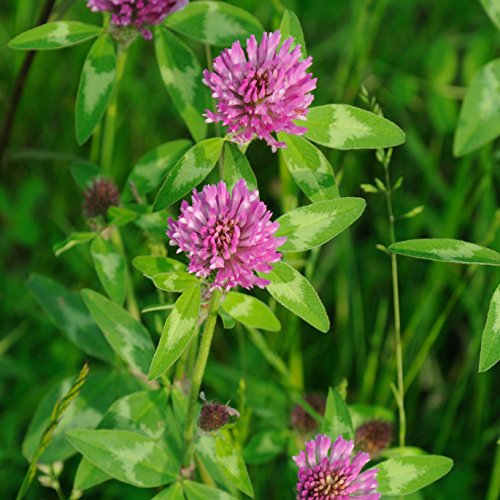
Perennial red clover seeds are a highly valuable forage legume that is widely cultivated in temperate regions across the United States. It is known to be a short-lived perennial that usually lasts between 3 to 5 years, but can persist beyond this due to self-seeding. Red clover is becoming increasingly important in the Deep South as a winter annual, and is grown using bulk clover seeds in the Pacific Northwest and other regions of the US. Due to its versatility and various uses, it is currently the most widespread clover used today.
Red clover is highly adaptable to a wide range of soil types, climatic conditions, fertility levels, and management practices. It is easy to establish and grows vigorously, making it an excellent nitrogen fixator. Red clover is relatively resistant to pests and diseases, which makes it a great choice for crop rotation programs. It is often grown with cool season grasses, but can be grown alone or with certain warm season perennial grasses. It can be used for pasture, hay or silage, and is an excellent soil improvement crop. Red clover has a longer growing season than any other clover grown in the United States.
Red clover is extremely attractive to insects, and bumblebees are its main pollinators. When planting the seeds, it is recommended to plant at a rate of 1/2 lb per 1,000 square feet or 8 to 16 lbs per acre. The ideal seeding depth is approximately 1/4 inch, but it is better to err on the side of being shallow rather than too deep. Good seed-soil contact helps ensure establishment. In the northern and central parts of the red clover belt, most red clover is seeded in late winter to early spring. However, autumn plantings are preferred in the Lower South.
- Highly valuable forage legume with various uses
- Easy to establish and grows vigorously
- Adapts well to different soil types, climatic conditions, and management practices
- Excellent nitrogen fixator
- Relatively resistant to pests and diseases
- Great for crop rotation programs and soil improvement
- Attractive to bumblebees which are its main pollinators
2. White Dutch Clover: The Ultimate Lawn Alternative
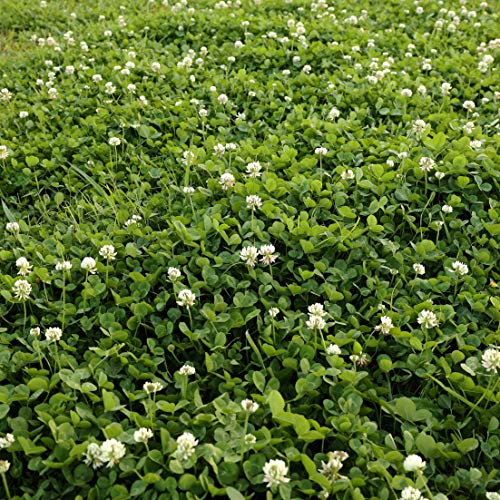
White Dutch Clover Seed is a versatile perennial that has a wide range of uses, including erosion control, lawn alternative, food plots, green manure crop, pasture mixtures, ground cover, and many more. It can be grown nationwide in USDA Zones 3-10 and is particularly useful for deer food plots, pasture mixtures, erosion control, and cover crops. White Clover is especially helpful in boosting soil nitrogen levels by fixing nitrogen from the air into the soil. Additionally, it can be used as an eco-friendly lawn alternative.
To plant White Dutch Clover Seed, broadcast the seeds onto the prepared soil and lightly rake them in. Keep the seeds moist until they germinate, which usually happens within 14 days at temperatures of 65-70F. For best results, sow the seeds at a rate of 1/4 lb – 1/2 lb per 1,000 square feet or 8 to 10 lbs per acre.
Whether you're looking for an effective erosion control solution, a lawn alternative, or a food plot for deer, White Dutch Clover Seed is an excellent choice that is easy to plant and maintain.
- Versatile perennial that can be used for many purposes
- Boosts soil nitrogen levels
- Eco-friendly lawn alternative
- Easy to plant and maintain
3. Seedranch White Dutch Clover Seed: Nitro-Coated & Inoculated – 10 Lbs.
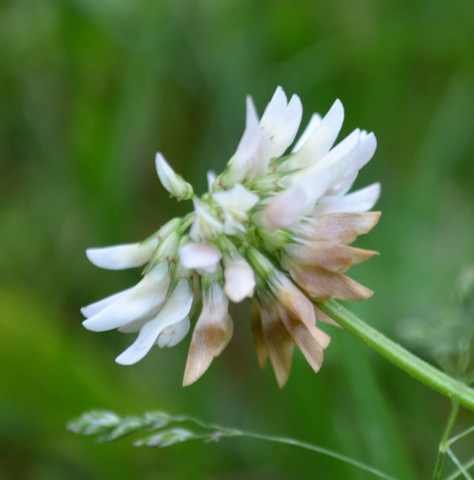
The Seeding Rate for this product is 10 Lbs. and it is suitable for planting on 1 acre of land. It is best suited for USDA Zones 3 to 10. This product is highly effective in controlling soil erosion, making it a great choice for yard management. It is also an exceptional alternative to traditional lawn grass.
This product is a natural fertilizer that is beneficial for your lawn. It aids in the fertilization process, which can help to reduce the need for chemical fertilizers. It is a cost-effective and environmentally friendly solution for lawn care.
- Effective in controlling soil erosion
- A great alternative to traditional lawn grass
- A natural fertilizer that aids in fertilization
- Cost-effective and environmentally friendly solution for lawn care
4. Outsidepride White Cloud Crimson Clover Cover Crop & Forage Seed – 5 Lbs
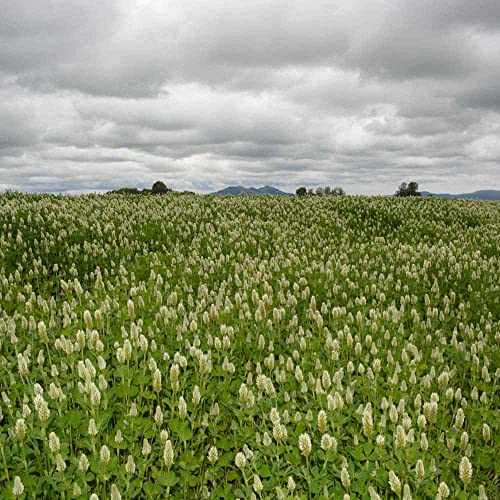
White Cloud Crimson Clover, a cultivar of Trifolium incarnatum, is the only white-flowered variant of this species available in the United States. It is a unique clover with white-colored flowers and seeds, making it an excellent choice for various applications. Unlike other varieties, White Cloud has lower levels of bitter anthocyanins, making it sweeter and more palatable for animals, which improves their intake.
Whether you're looking for hay, pasture, silage, livestock, forage, wildlife food plots, cover crops, green manure crops, crop rotations, nitrogen fixators, or ground cover, this crimson clover is an excellent choice. With its high dry matter yield and annual clover's ability to fix nitrogen, White Cloud is a popular cover crop or rotation/green manure crop. Depending on your needs, planting can be done throughout most of the year. It is recommended to use 20-25 lbs of seed per acre for broadcast seeding.
- Unique white-colored flowers and seeds
- Lower levels of bitter anthocyanins make it sweeter and more palatable
- Suitable for various applications including hay, pasture, silage, livestock, forage, wildlife food plots, cover crops, green manure crops, crop rotations, nitrogen fixators, and ground cover
- High dry matter yield
- Annual clover's ability to fix nitrogen
5. Crimson Clover For Versatile Farming – 5lbs
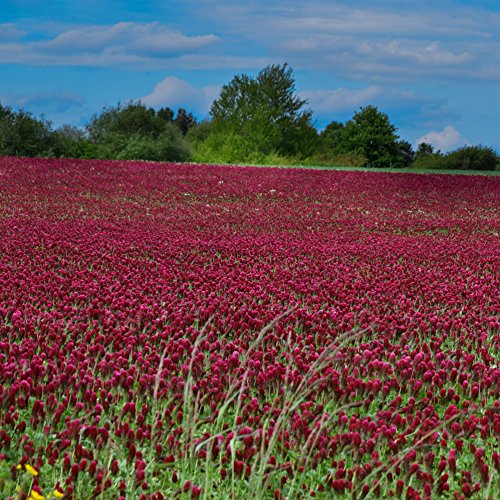
The Crimson Clover is an excellent source of high protein, providing crucial nutrients for the growth of whitetail deer and other wildlife. This crop can also be used for hay production or as a cover crop. It is a winter annual that grows from bulk clover seeds found along the Gulf Coast to Southern Ohio and the West Coast. This crop is tolerant of medium soil acidity and can grow in sandy and clay type soils. It thrives when planted with grasses and is an important winter annual forage in the south. Its growth continues through winter, with the amount influenced by temperature.
Crimson Clover is a productive and palatable cool-season forage for deer. It is a fast-growing crop that can withstand heavy continuous grazing and produces a consistent, heavy seed crop with good reseeding potential. The flower heads of this crop are long, crimson, and very showy. When harvested for forage in the pre-bloom stage, it is high in nutritive value. The Dixie reseeding crimson clover is an important component of many of Pennington's Rackmaster Wildlife Seed mixtures. These heirloom seeds are non-GMO and open-pollinated. Rest assured that these are quality seeds. Our crimson seed is coated and inoculated for optimum germination and growth.
Crimson Clover can be planted for forage and hay in livestock pastures. When planted in the fall, it makes for a great late-winter grazing crop and thrives when planted with grasses. It makes good hay and thrives in a mixture with grasses. Crimson Clover seeds and annual ryegrass make an excellent cover crop mixture, improving the texture, organic matter, and tilth of soil. Sow seeds at 1/2 – 3/4 lb per 1,000 square feet or 20 to 30 lbs per acre.
- Provides crucial nutrients for the growth of whitetail deer and other wildlife
- Can be used for hay production or as a cover crop
- Tolerant of medium soil acidity and can grow in sandy and clay type soils
- Thrives when planted with grasses and is an important winter annual forage in the south
- Productive and palatable cool-season forage for deer
- Fast-growing crop that can withstand heavy continuous grazing and produces a consistent, heavy seed crop with good reseeding potential
- Non-GMO and open-pollinated heirloom seeds
- Quality seeds coated and inoculated for optimum germination and growth
6. Hancock Seed Co, Micro Clover Seed, 5 Lb Bag
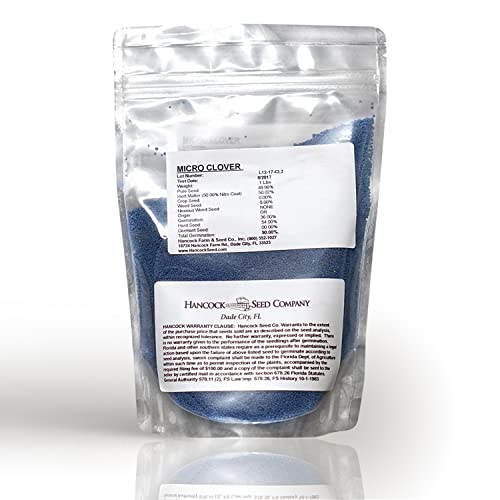
Hancock Seed Co. Microclover is an excellent choice for those who want to improve their lawn's health by providing natural nutrients. This seed is surrounded by a clay-based coating that aids in moisture retention, making it easier to germinate and ensuring better overall success. The resulting turf is dense, lush, and beautiful, with a dark shade of green that is comparable to traditional lawns.
One of the most notable features of this microclover is its extreme cold tolerance. It may go dormant slightly during the winter months, but it is very aggressive and will most likely come back under harsh winter conditions. It can withstand cold, drought, and traffic, as well as wet, not to be flooded for long periods of time, and shade conditions. However, it may lose some vigor and dull in color during light dormancy.
Hancock Seed Co. Microclover is also resistant to various environmental conditions. It can tolerate harsh weather and traffic, making it a great option for high-traffic areas. It can also withstand drought and shade conditions.
This Microclover seed is grown, harvested, and processed by Hancock Farm & Seed Co., a fourth-generation family-owned and operated company in Florida, USA. They have been providing top-quality seeds at an affordable price since 1978.
Overall, Hancock Seed Co. Microclover is an excellent choice for those looking to improve their lawn's health and appearance. Its various features, including its natural nutrients, extreme cold tolerance, and resistance to different environmental conditions, make it a great option for any lawn. Plus, its easy maintenance and direct sourcing from farmers make it a reliable and convenient choice for any homeowner.
- Provides natural nutrients for existing lawn grasses
- Dense, lush, and beautiful turf with a dark shade of green
- Extreme cold tolerance and can withstand harsh winter conditions
- Resistant to various environmental conditions such as drought and shade
- Easy maintenance and direct sourcing from farmers since 1978
- – May lose some vigor and dull in color during light dormancy
7. Ladino Clover Seed: Nitro-Coated, Inoculated – 10 Lbs
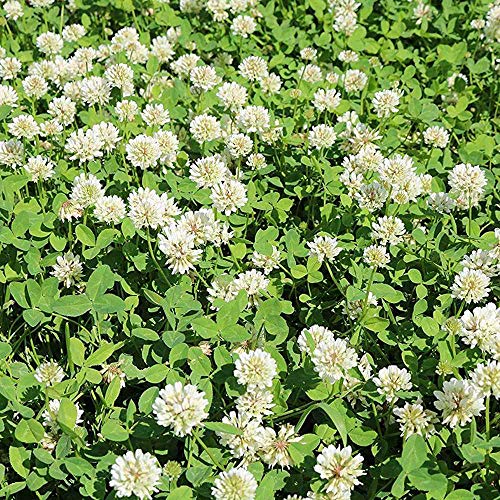
Ladino clover is a giant white clover that grows as a perennial and is abundant across the United States. It is a highly desirable clover due to its palatability, making it an excellent addition to pasture mixtures and deer food plots. Sowing the Trifolium repens latum seed at 1/2 lb – 3/4 lb per 1,000 square feet or 8 to 10 lbs per acre can lead to best results.
To sow Ladino clover, one can broadcast the seed on the prepared soil and rake it in lightly. To ensure germination, it is recommended to keep the clover seed continually moist. The seed's weight includes approximately 34% coating material that contains the inoculant and water-holding material, improving the seed's establishment and viability.
- Palatable clover, making it an optimal choice for pasture mixtures and deer food plots
- Perennial clover, providing a long-term solution
- Comes with coating material that contains inoculant and water-holding material for better establishment and viability
8. Whitetail Institute Imperial Clover Food Plot Seed (Spring And Fall Planting), 4-Pound (1/2 Acre)
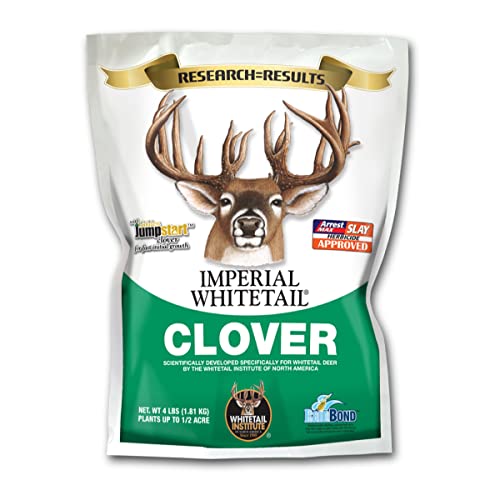
The Antler-Building Protein-packed product is designed to help does deliver heavier and healthier fawns, and produce more milk. It is highly cold-tolerant and can also withstand heat and drought. The product is coated with RainBond to enhance seedling survivability. It can last up to 5 years from a single planting, ensuring long-term benefits.
This product is an excellent choice for those who want to improve deer health and increase the population. It provides a reliable source of protein and other essential nutrients that help deer grow and thrive. With enhanced seedling survivability, the plants are more resistant to weather conditions and other environmental factors. It is also easy to plant and requires minimal maintenance, making it a hassle-free option.
- Packed with Antler-Building Protein to help does deliver heavier and healthier fawns, and produce more milk
- Cold-tolerant and can withstand heat and drought
- Coated with RainBond to enhance seedling survivability
- Lasts up to 5 years from a single planting
9. Open Seed Vault's Survival Seed Variety Pack
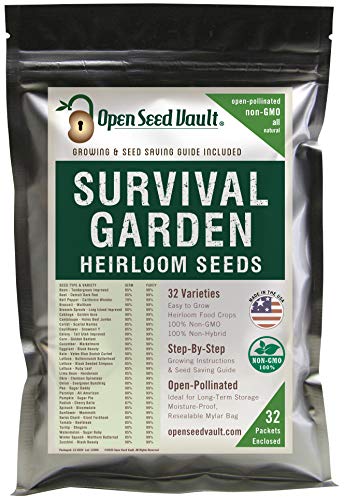
The OSV garden vegetable seeds are 100% USA heirloom, open-pollinated, non-hybrid, raw, and chemically untreated. These high-quality food seeds have never been sourced from Monsanto and never will be! The seeds are perfect for survivalists, preppers, and emergency situations such as hurricanes, tornadoes, floods, droughts, war, famine, and other natural disasters or acts of God. These seeds are essential for bug-out bags, preparedness kits, camping gear, and survival gear equipment.
Each variety seed pack in the kit includes up to 3,000 seeds and can produce up to 15,000 fruits and vegetables. The pack includes a wide range of seeds such as beans, pumpkin, lettuce, tomatoes, sunflower, radish, spinach, carrots, cucumbers, watermelon, squash, peppers, eggplants, and many more. These seeds come with step-by-step instructions and a seed-saving guide that is easy to use and packed with information. The guide includes planting time suggestions, harvesting instructions, and a primer on seed saving that will help turn your garden into an everlasting food supply.
The OSV garden vegetable seeds are 100% USA homegrown with high germination rates and 99% purity. The seeds are stored in an airtight, moisture-proof, and resealable bag for safe, long-term food and storage. These seeds are perfect for gifting to a gardener or for personal use in your garden.
- 100% USA heirloom, open-pollinated, non-hybrid, raw, and chemically untreated seeds
- Seeds have never been sourced from Monsanto
- Perfect for survivalists, preppers, and emergency situations
- Essential for bug-out bags, preparedness kits, camping gear, and survival gear equipment
- Each variety seed pack includes up to 3,000 seeds and can produce up to 15,000 fruits and vegetables
- Comes with step-by-step instructions and a seed-saving guide
- High germination rates and 99% purity
- Seeds are stored in an airtight, moisture-proof, and resealable bag
10. Ecoroll: Biodegradable Erosion Blanket With Staples (Brand: American Excelsior, Category: Landscape)
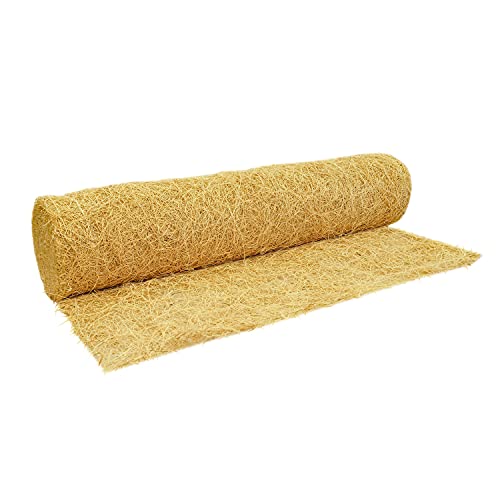
This erosion control blanket is an excellent solution for complying with most storm water management regulations. It is DOT approved and can be easily installed using 20 E-Staples that come included in the package. The blanket can enhance grass seed germination by retaining water, which is especially helpful during dry seasons. However, it does not come with grass seeds. The blanket also protects seeds from birds and the sun's heat, making it ideal for outdoor use. It is degradable and the fibers cling to each other and soil to hold seed and soil in place. The durable single net made of plastic ensures that the blanket remains intact for a long time. This product is made in the USA, ensuring that it meets all quality standards.
- Complies with most storm water management regulations
- DOT approved
- Fast and easy installation with 20 E-Staples included
- Enhances grass seed germination by providing super water retention
- Protects seeds from birds and sun's heat
- Degradable and eco-friendly
- Durable single net made of plastic
- Made in the USA
Best Clover For Frost Seeding FAQs
How do soil conditions affect the success of clover frost seeding?
Soil conditions play a crucial role in the success of clover frost seeding. Clover is a cool-season legume that thrives in soil that is well-drained, fertile, and has a pH level between 6.0 and 7.0. Before sowing clover seeds, it is essential to assess the soil's nutrient levels and pH level to ensure that the conditions are optimal for the seeds to germinate and sprout.
If the soil is too acidic or alkaline, the clover seeds may fail to germinate or may not grow properly. Moreover, soil that is compacted, poorly aerated, or has inadequate drainage can also hinder the growth of clover. In such cases, amending the soil by adding organic matter, such as compost or manure, can help improve soil structure, texture, and drainage.
Another factor that can impact the success of clover frost seeding is the timing of sowing. Clover seeds should be sown in late summer or early fall when the ground is moist and the temperatures are cooler. This allows the seeds to establish roots and grow before winter sets in.
In conclusion, the success of clover frost seeding is largely dependent on the soil conditions. By ensuring that the soil is well-drained, fertile, and has a suitable pH level, farmers and gardeners can increase the chances of a successful clover crop.
What are some common mistakes to avoid when frost seeding clover?
When it comes to frost seeding clover, there are a few common mistakes that you should avoid to ensure the success of your clover crop. Firstly, it's important to avoid seeding too early or too late in the season. If you seed too early, the clover may not survive the winter, while seeding too late can result in poor germination rates.
Another mistake to avoid is seeding too heavily. While it may be tempting to spread a lot of seeds, this can actually lead to overcrowding and poor growth. Instead, aim for a seeding rate of around 2-4 pounds per acre.
Additionally, it's important to ensure that the soil is properly prepared before seeding. This means removing any weeds or debris, and ensuring that the soil is loose and aerated.
Finally, make sure to choose the right type of clover for your specific climate and soil conditions. Some types of clover may not be well-suited to certain regions, so do your research before selecting a variety to plant.
By avoiding these common mistakes, you can increase the chances of a successful clover crop and enjoy the many benefits that this versatile plant can provide.
What are the recommended seeding rates for frost seeding clover?
The recommended seeding rates for frost seeding clover can vary depending on various factors such as the type of clover, soil conditions, and climate. However, as a general rule of thumb, it is recommended to use 1 to 2 pounds of clover seed per 1,000 square feet of land. This amount can be increased if the soil is poor or if the climate is harsh.
It is important to note that frost seeding is a technique used to sow seeds during the late winter or early spring when the ground is still frozen. This helps to take advantage of the natural freeze-thaw cycles and allows the seeds to penetrate the soil more easily. Clover is an ideal candidate for frost seeding because it is a hardy plant that can tolerate cold temperatures and grow quickly.
Overall, the recommended seeding rates for frost seeding clover can vary, but it is important to follow the instructions provided by the seed manufacturer and to take into consideration the soil and climate conditions of the area being seeded. The proper seeding rate is essential for achieving a successful crop and ensuring optimal growth and yield.
What is frost seeding and how does it benefit clover growth?
Frost seeding is a technique used in agriculture to promote the growth of clover in fields. It involves broadcasting clover seed over a field during the late winter or early spring when the ground is still frozen. As the snow melts and the ground thaws, the seed is drawn down into the soil by the freeze-thaw cycle. This process helps to ensure that the clover seed gets good soil contact and is able to germinate successfully.
The benefits of frost seeding for clover growth are numerous. First, it's a cost-effective way to establish a crop of clover without the need for tillage or planting equipment. Second, frost seeding helps to improve soil health by adding nitrogen to the soil, which is essential for plant growth. Third, clover is a great source of forage for livestock, and frost seeding can help to increase the overall productivity of a pasture or hayfield. Finally, clover is also an important component of sustainable farming practices, as it helps to reduce erosion and improve soil structure. Overall, frost seeding is a simple and effective way to promote the growth of clover and improve the health of agricultural fields.
What is the best time of year to frost seed clover?
The best time of year to frost seed clover is typically in late winter or early spring, when the ground is still frozen but beginning to thaw. This is because the freeze-thaw cycle helps to create the ideal conditions for seed germination. The freeze-thaw action causes small cracks in the soil, which allows the seed to penetrate deeper into the soil and establish a strong root system. Additionally, the cold temperatures help the seed to remain dormant until the soil warms up enough for growth to begin. Frost seeding can also be done in the fall, but there is a greater risk of the seed being washed away by heavy rain or snow. Overall, the key to successful frost seeding is to ensure that the seed has enough time to establish itself before the hot summer months arrive, as clover is a cool season crop and does not do well in extreme heat.

